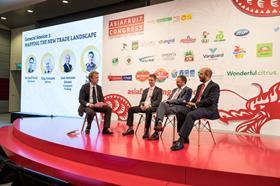
The rise of protectionism may be fuelling uncertainty in the global economy, but it is also creating new opportunities for fresh produce shippers. This was the take-home message in the concluding session at this year’s Asiafruit Congress in Hong Kong on the new trading landscape, which heard how market diversification was key to managing increased risk.
Michael Every of Rabobank kicked off the session with a thought-provoking presentation showing how history can be a useful guide in predicting the fallout from the current wave of protectionism sweeping the globe.
With the dollar-based global trading model looking more and more precarious, the emergence of new trading alliances such as China’s One Belt One Road initiative will have major implications for fruit producers, Every warned.
The politicisation of world trade could lead to new alliances emerging and old ones crumbling, and fruit producers could find themselves caught in the middle of an ugly trade war that forces them to choose between trade partners.
In the panel discussion that followed Early’s presentation, Camposol Trading’s José Antonio Gómez pointed out that the rise of protectionism in traditional markets is being offset by growing trade with countries like China.
He said the recent opening of Camposol’s new office in Shanghai was a “statement of intent” from the company. “There are a lot of things we need to develop and understand in China but the size of the prize is so big that we can’t afford not to be there,” he told delegates.
With 90 per cent of the world’s population living in the Northern Hemisphere and most of the agricultural resources found in the Southern Hemisphere, Gómez claimed the outlook for fresh produce companies remained favourable – provided they are able to build solid relationships and ensure that their markets are sufficiently diversified.
Filip Fontaine of Belgium’s BelOrta shared this optimism, insisting that European producers had already proven themselves to be well equipped to deal with shifts in the global trading landscape by regrouping quickly in the wake of the Russian embargo to find new markets, including China.
Prior to the ban, the Russian market accounted for 50 per cent of BelOrta’s turnover and Fontaine said the company had learnt the hard way not to put all its eggs into one basket.
Wayne Prowse of Fresh Intelligence Consulting warned that Latin America’s export industry was becoming heavily reliant on China, unlike the US which had much more diverse trading partners in Asia.
However Gómez reiterated that the outlook was more positive than negative, observing that “uncertainty creates opportunity: it’s all about measuring the risk involved”.



